Shopify vs 10Web: Final verdict
Shopify and 10Web both offer robust platforms, but they cater to different needs and user preferences.
Shopify (Overall Grade: 8.1/10)
is a comprehensive ecommerce platform ideal for businesses looking to scale their online stores. It excels in providing advanced ecommerce tools, seamless integrations, and strong customer support. When comparing Shopify vs 10Web, Shopify is the go-to choice for users who prioritize a dedicated ecommerce solution with extensive features for product management, payment processing, and marketing.
10Web (Overall Grade: 8.6/10)
stands out with its AI-powered capabilities and WordPress integration, making it perfect for users who want to leverage AI for website creation and management. Considering Shopify vs 10Web, 10Web offers a more flexible design experience, superior speed optimization, and excellent customer support, making it a great choice for those who value ease of use, AI-driven features, and comprehensive WordPress functionality.

|

|
|
|---|---|---|
Design functionalities & templates |
8.2 |
9.0 |
Ease of use |
7.5 |
7.9 |
Ecommerce |
9.2 |
8.7 |
Website Editors |
7.9 |
8.9 |
Product testing options |
8.1 |
7.6 |
Price |
8.2 |
8.2 |
Hosting quality |
9.0 |
8.7 |
Website speed optimization |
7.8 |
9.5 |
Plugins and integrations |
8.7 |
9.1 |
Marketing features |
8.8 |
7.2 |
Customer support |
8.6 |
9.1 |
Security |
9.0 |
9.2 |
AI capabilities |
7.9 |
9.2 |
User Management |
6.5 |
8.7 |
Which one is the best for ecommerce: Shopify or 10Web?
 9.2
9.2
 8.7
8.7
Verdict
: Shopify is a powerhouse for dedicated ecommerce needs, while 10Web offers flexibility and AI-driven features for WordPress-based stores.
Shopify
: Known for its comprehensive ecommerce features, Shopify is ideal for businesses with
growth in mind. It supports a wide range of ecommerce functions, making it the go-to platform for those looking to scale. Shopify’s extensive app library and advanced analytics further enhance its ecommerce capabilities, making it a robust choice for serious online retailers.
10Web
: Leveraging AI to simplify WordPress site management, 10Web is perfect for those who want to combine the power of WordPress with advanced AI tools. It offers extensive customization options and a variety of ecommerce features, making it a flexible choice for businesses looking to optimize their online stores with AI-driven solutions.
Which one is the best for informational and business websites?
 6.8
6.8
 9.2
9.2
Verdict
: When it comes to creating and managing informational and business websites, 10Web outshines Shopify. With its AI-powered platform, ease of use, and extensive customization options, 10Web is the preferred choice for those looking to build a robust online presence without the complexities of ecommerce.
Shopify
: Shopify is primarily an ecommerce platform, making it less ideal for purely informational websites. While it offers sleek and professional templates, its focus on ecommerce functionalities can make it feel overly complex for simple business sites. Shopify’s score of 6.8 reflects its limitations in this area, as it is better suited for users who need comprehensive tools for online stores.
10Web
: 10Web excels in creating informational and business websites, scoring an impressive 9.2. Its AI-powered platform simplifies the process of building and managing WordPress sites, offering a wide array of templates and customization options. The integration with Elementor provides extensive design flexibility, making it easy to create visually appealing and highly functional websites. For those comparing Shopify vs 10Web, 10Web’s user-friendly interface and advanced features make it the superior choice for informational and business websites.
Shopify vs 10Web: Detailed comparison
Design functionalities & templates
Design FunctionalitiesRepresents how well each platform allows for creative design and customization of websites.Score Components:
- Template Variety (30%): Range and quality of design templates.
- Customization (30%): Flexibility and options for design alterations.
- User Interface (20%): Ease and intuitiveness of the design process.
- Responsiveness (10%): Adaptability to different devices and screen sizes.
- Innovation (10%): Unique design features and tools.
 8.2
8.2
 9.0
9.0
🏆
Winner: 10Web.
If you’re looking for a platform that offers more creative control and a wide array of design features, 10Web is the preferred choice.
Shopify’s templates are sleek and professional, ideal for ecommerce sites. They offer a sophisticated look with a focus on online stores. While the free template selection is not large, Shopify’s premium theme store provides a variety of industry-specific options, offering advanced features for a strong brand presence.
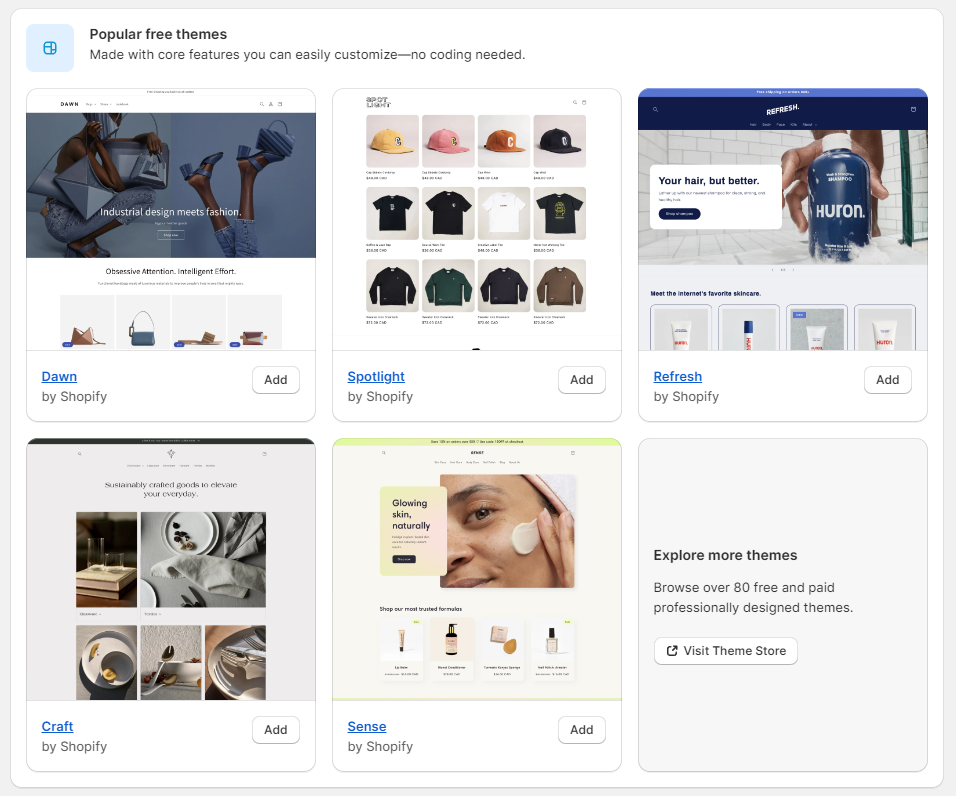
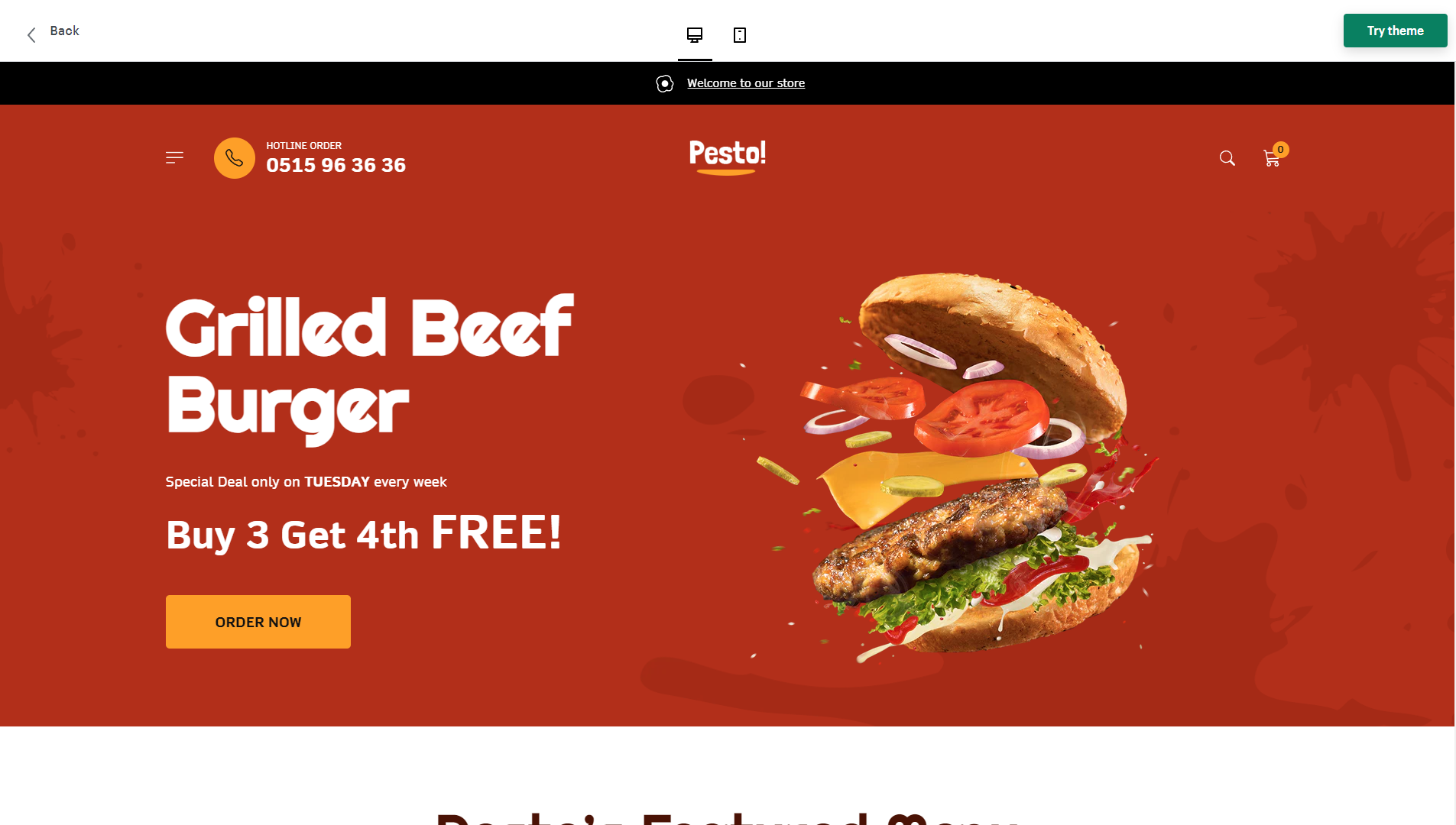
Compared to Shopify, 10Web stands out with its AI-powered platform that generates templates based on industry and specific requirements of your business. These templates cover various industries and functionalities, including business, portfolio, ecommerce, blogs, etc. Additionally, since 10Web is based on WordPress and Elementor editor, you can use tens of thousands free or premium templates for Elementor with 10Web.
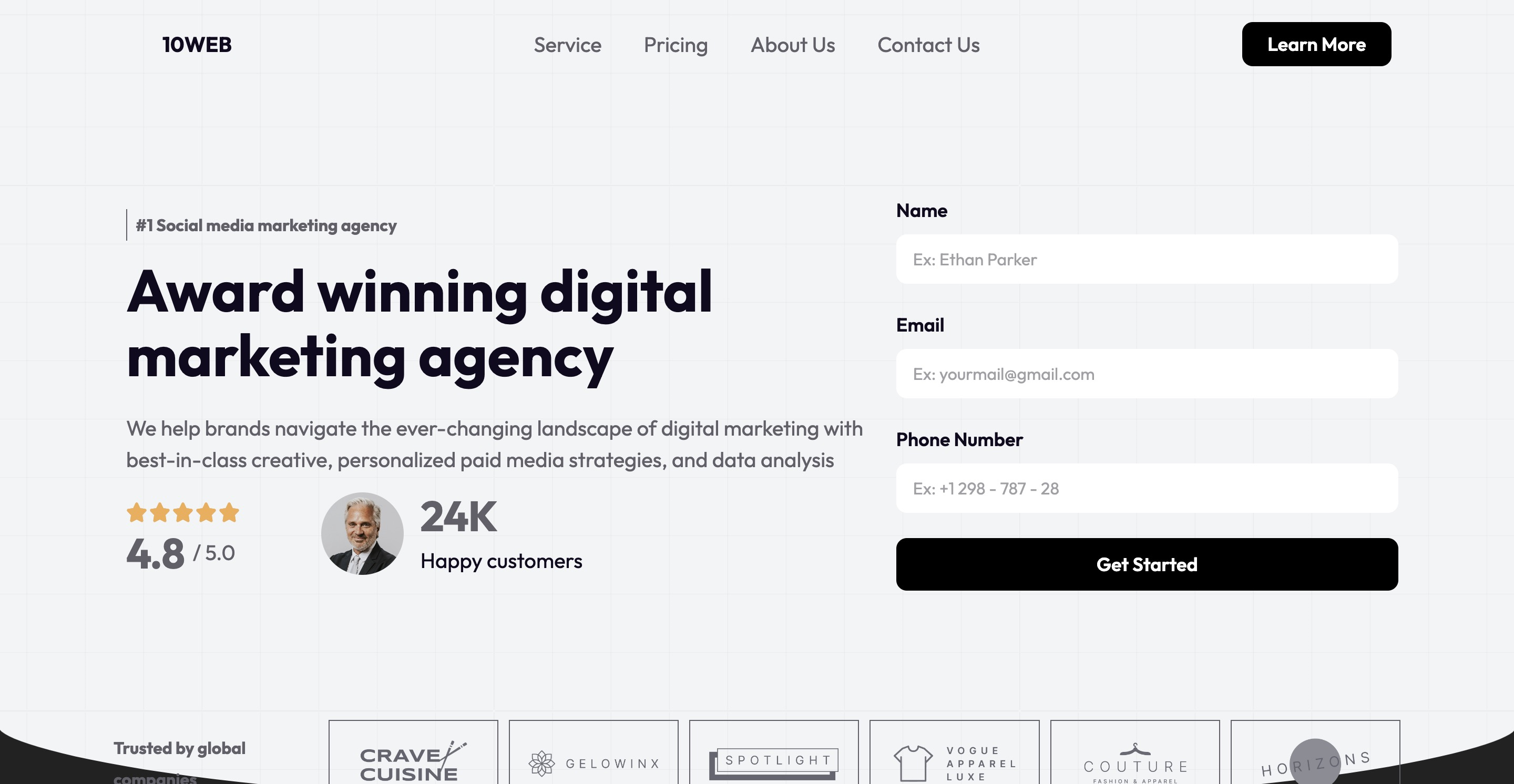
Get a head start on website creation with AI
Create a custom website tailored to your business needs 10X faster with 10Web AI Website Builder!
Ease of use
Ease of useReflects the platform’s overall user-friendliness.Score
Components:
- Learning curve (40%): Quickness and ease of getting started.
- Interface design (30%): Simplicity and intuitiveness of layout.
- User guidance (20%): Quality of tutorials and support.
- Flexibility (10%): Adaptability to various user skills.
 7.5
7.5
 7.9
7.9
🏆 Winner: 10Web
. Scoring a 7.9, 10Web edges out Shopify (7.5) in terms of ease of use. 10Web’s AI-powered platform simplifies the process of creating and managing WordPress websites, making it a user-friendly choice for both beginners and advanced users. Shopify, while praised for its ease of use, has a slightly steeper learning curve, especially for those new to ecommerce.
Learning Resources
🏆 Winner: 10Web
. Both platforms offer extensive learning resources, but 10Web goes a step further with its AI chatbot that provides real-time access to relevant help center articles. This feature, combined with detailed tutorials, how-to guides, and a regularly updated blog, makes 10Web’s learning resources more comprehensive and accessible.
For ecommerce
EcommerceMeasures the platform’s effectiveness in supporting online business activities.Score Components:
- Ecommerce themes and templates (20%): Variety and design of templates.
- Product management (25%): Ease of managing and organizing products.
- Payment options (25%): Variety and convenience of payment methods.
- Ecommerce features (20%): Features for managing an ecommerce store.
- Integration (10%): Compatibility with external e-commerce tools and services.
 9.2
9.2
 8.7
8.7
Shopify and 10Web both offer robust ecommerce solutions, but they cater to different needs. Shopify is a comprehensive ecommerce platform with a wide range of tools for product listing, payments, and order fulfillment. It’s ideal for businesses that want a dedicated ecommerce platform. On the other hand, 10Web is an AI-powered platform that simplifies the process of creating and managing WordPress websites. It’s perfect for businesses that want to leverage the power of WordPress and AI for their ecommerce needs.
 |
 |
|
|---|---|---|
Ecommerce themes and templates |
8.2 |
9.3 |
Product page customization |
8.5 |
9.4 |
Payment processing and commissions |
8.8 |
8.9 |
POS capabilities |
8.1 |
7.0 |
Payment gateways |
9.5 |
9.0 |
Product numbers |
9.0 |
10.0 |
Additional ecommerce features |
9.1 |
9.2 |
Shopify ecommerce features:
- Comprehensive store builder
- Shopify Payments and other gateways
- Advanced inventory management
- Multi-channel selling
- Abandoned cart recovery
- Detailed analytics and reporting
10Web ecommerce features:
- Unlimited products
- Product Description & image generation with AI
- Inventory management
- Order tracking
- Manual order creation
- Sales and refunds tracking
- Ecommerce website speed optimization
- Sales and refunds tracking
- Automated tax setup
- Advanced filter
- Automated WooCommerce integration
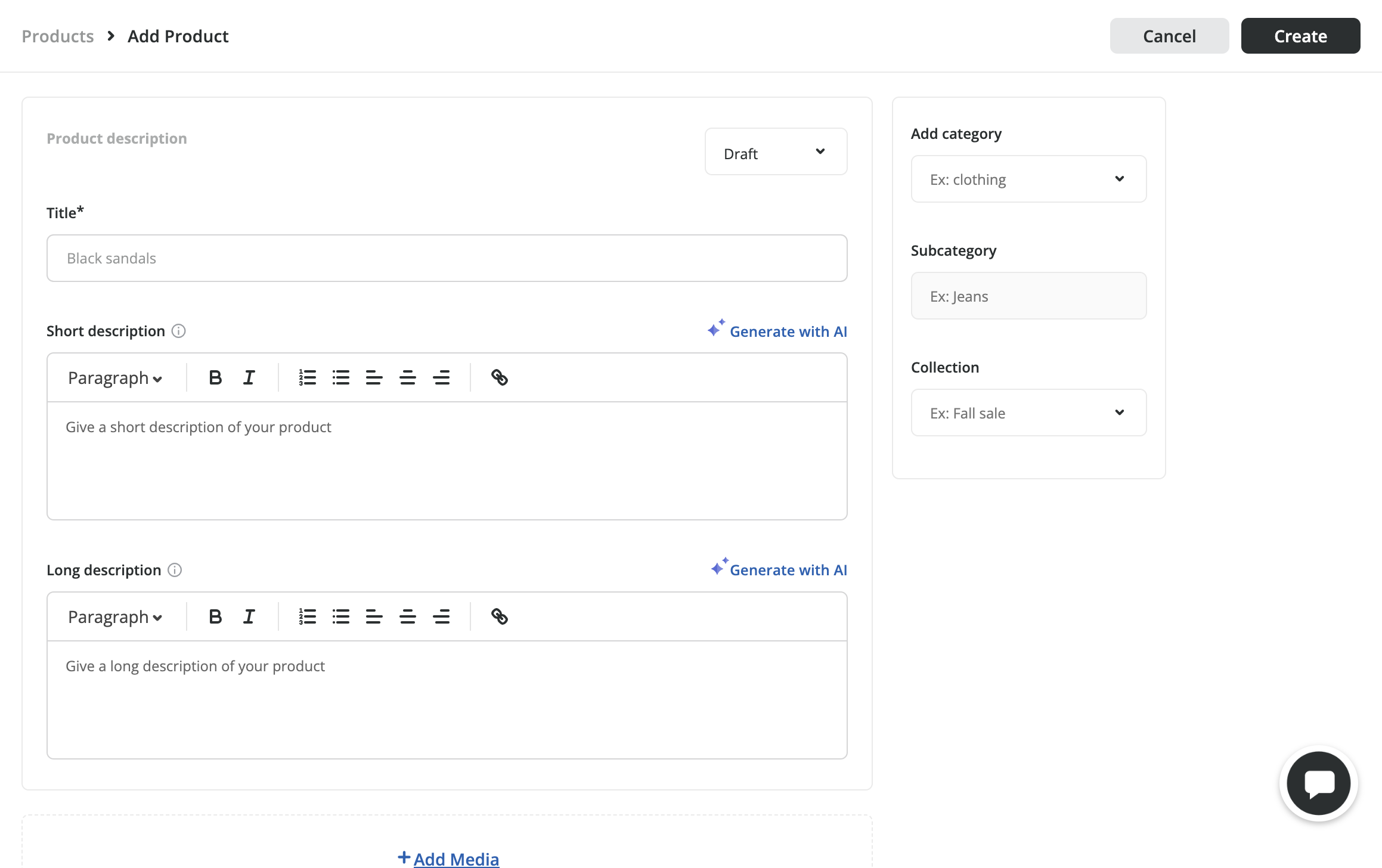
Ecommerce themes & templates
Shopify offers about 150 modern responsive themes for creating a virtual storefront, ensuring a good look on both desktop and mobile devices. While some themes are free, others cost between $170 to $380. In contrast, 10Web uses AI to generate templates based on the specific requirements of your ecommerce store. Additionally, since 10Web is based on WordPress and Elementor editor, you can use tens of thousands of free or premium templates for Elementor with 10Web.
Product page customization
Shopify has a limit of three options per product, totaling 100 unique variations. This limit may not pose a significant constraint, and it is suggested that for products with numerous options, creating separate listings on Shopify can be a more manageable approach. While Shopify offers titles, descriptions, and image galleries with zoom effects, customization options like adding ribbons, size charts, and wishlists are not as straightforward. However, Shopify distinguishes itself with additional features through its extensive library of extra apps, offering functionalities like reviews, Facebook stores, eBay item importers, and a unique Augmented Reality feature for an enhanced customer experience.
On the other hand, 10Web allows for full customization of your product pages using its 10Web drag-and-drop builder powered by Elementor. You can change layouts, colors, fonts, backgrounds, and whatever you wish for. 10Web also allows adding custom HTML and editing all the existing sections with coding, giving you full flexibility. They also have ecommerce widgets to help you easily add ecommerce elements with drag-and-drop functionality.
Payment processing
When it comes to payment processing, Shopify offers payments with typical charges of
2.9% + 30¢
per online transaction on basic plans, and lower fees for higher-tier plans. However, it adds extra fees for using other payment gateways. Shopify Payments is Shopify’s own payment processing gateway. It allows merchants to accept credit card payments directly on their store without having to integrate third-party payment providers. This simplifies the payment process, reduces transaction fees, and streamlines the handling of finances.
10Web allows you to activate 10Web Payments for processing your payments for your store. In this case, the transaction fees are from
2.9% to 1%
depending on the plan. You can also add different payment methods such as WooPay, Paypal Stripe, and many others. This makes 10Web a flexible option for businesses using diverse payment processors.
Website Editors
Website EditorsEvaluates the platforms’ website building and editing capabilities.Score Components:
- Customization tools (40%): Range and power of editing features.
- Editor usability (30%): User experience within the editor.
- Design flexibility (20%): Freedom in layout and design changes.
- Update and maintenance ease (10%): Simplicity of updating and maintaining the site.
 7.9
7.9
 8.9
8.9
🏆
Winner: 10Web
. 10Web, with a score of 8.9, offers an editor based on the powerful and flexible Elementor page builder, renowned for its user-friendly interface and extensive customization capabilities. This integration allows users to leverage Elementor’s drag-and-drop functionality, enabling the creation of complex layouts and designs without needing to write code. The editor offers a wide array of widgets, style options, and design elements, making it possible to craft fully customized and responsive websites with ease.
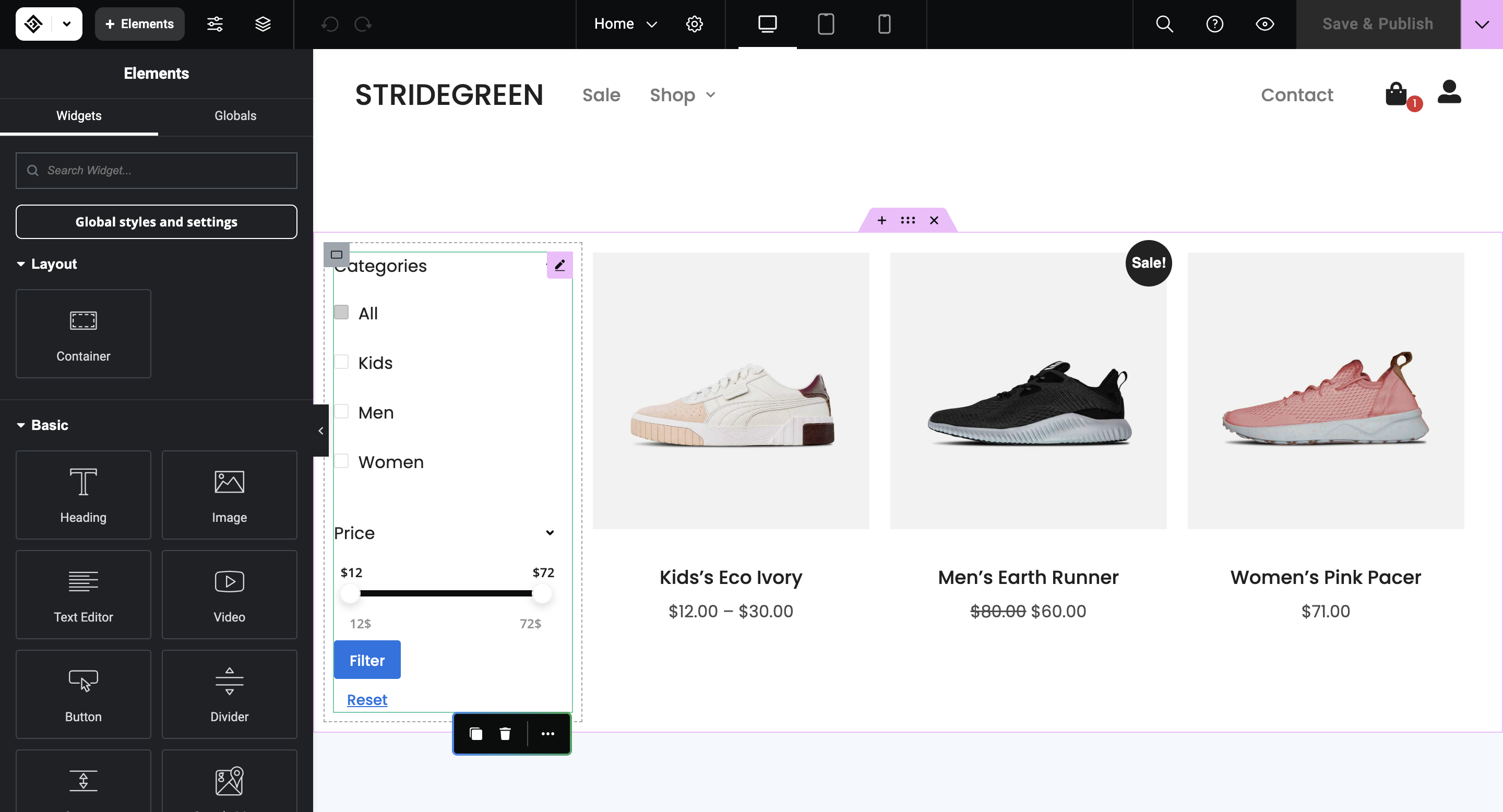
Shopify’s editor, scoring 7.9, excels in providing a streamlined, ecommerce-focused editing experience. It’s particularly beneficial for users who prioritize efficient management of online stores. The editor is straightforward, making it easy to add products, manage inventory, and set up payment methods. While it may not offer the same level of design flexibility as 10Web, Shopify’s editor is optimized for sales and business growth, with built-in tools specifically designed for ecommerce businesses.
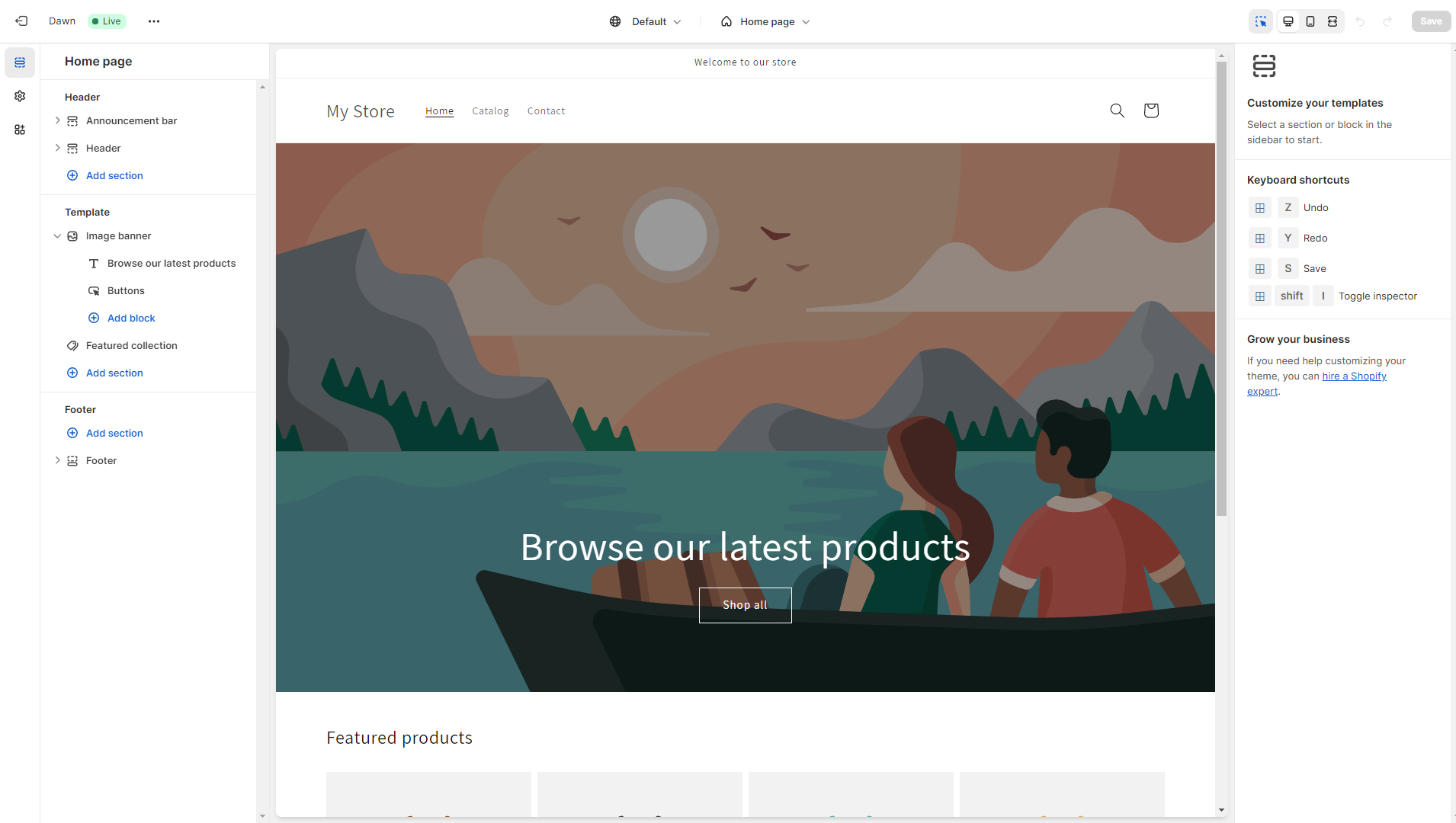
Mobile editor/app
 8.0
8.0
 7.0
7.0
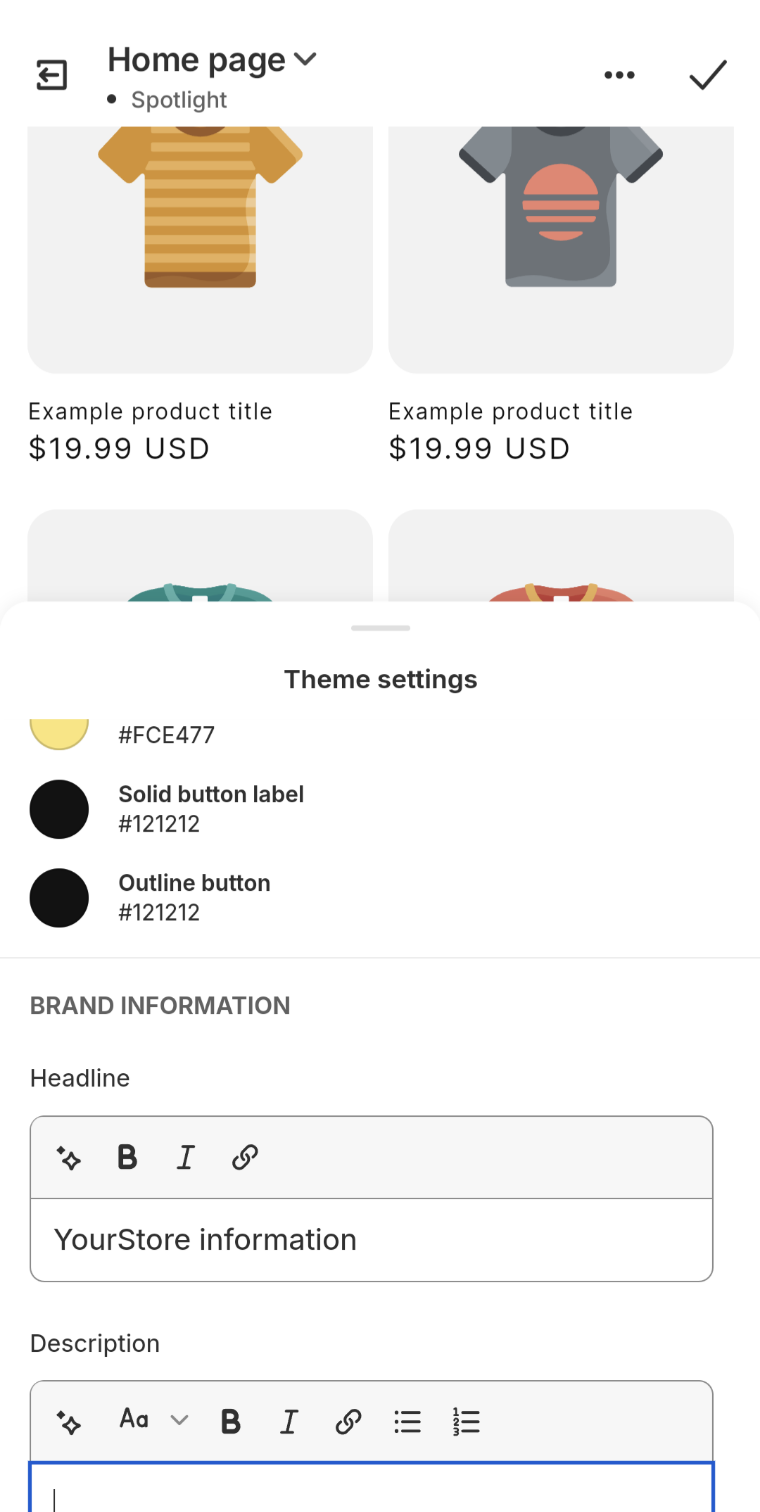
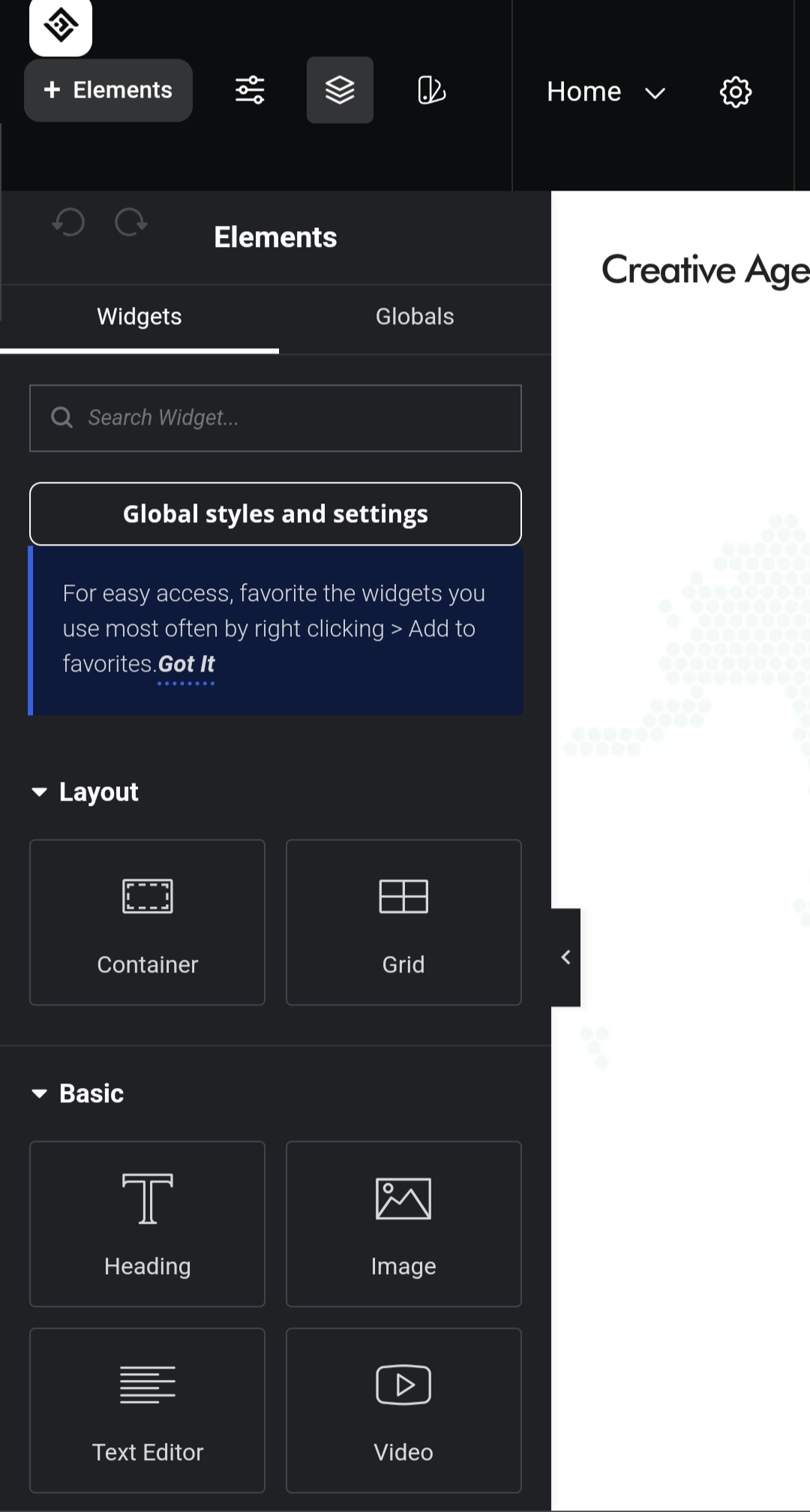
🏆
Winner: Shopify
. Both Shopify and 10Web offer mobile editing capabilities, but they cater to different needs and skill levels. Shopify has a dedicated mobile app that allows users to customize their online store directly from their mobile device. This feature enables the addition, removal, editing, and rearrangement of content on the store’s website, offering convenient on-the-go adjustments to the store’s appearance and layout.
On the other hand, 10Web does not provide a specific mobile app for editing. However, you can fully edit and manage your website effectively using its mobile-optimized web version. This version includes all the functionalities of the desktop version, tailored for a mobile-friendly user interface. Despite the lack of a dedicated mobile app, 10Web’s mobile-optimized web version provides a comprehensive editing experience.
In summary, Shopify receives a higher rating due to its dedicated mobile app, which provides a more streamlined and convenient mobile editing experience. However, 10Web also offers a robust mobile editing experience through its mobile-optimized web version.
Product testing options
Product Testing OptionsAssesses the options for trying out platform features before commitment.Score Components:
- Trial quality (40%): Extent and usefulness of the trial or free version.
- Feature accessibility (30%): How many features are available to test.
- Trial duration (20%): Length of the trial period.
- Ease of transition (10%): Smoothness of moving from trial to paid plans.
 8.1
8.1
 7.6
7.6
Overall Result
:
Shopify wins
. Shopify scores 8.1, offering a 14-day free trial with access to all features, while 10Web scores 7.6, offering a 7-day free trial of all premium plans for up to 10 websites. Although 10Web allows testing of all premium features during the trial period, it falls short in terms of trial duration compared to Shopify.
 |
 |
|
|---|---|---|
Free Plan |
No (14-day free trial) | Only for the AI generated website |
Trial Duration |
14 days | 7 days (up to 10 websites) |
Testing Premium Features |
All features during free trial |
All features during free trial |
Price
PriceLooks at the cost-effectiveness and value for money of each platform.Score Components:
- Plan value (40%): What each pricing tier offers.
- Transparency and clarity (30%): Clearness of pricing structures.
- Flexibility of plans (20%): Range of options to suit different budgets.
- Hidden costs (10%): Additional expenses not included in the plan.
 8.2
8.2
 8.2
8.2
Shopify and 10Web have the same price score, but they cater to different needs.
Shopify is more focused on ecommerce, while 10Web is designed for WordPress websites. Both offer discounts for annual subscriptions, with 10Web offering a higher discount of up to 50%.

|

|
|
|---|---|---|
$10-$20 |
No offering at this amount. |
AI Starter ($20/month): Suitable for individuals and small businesses, up to 5K words Elementor AI assistant, 10K monthly visitors, 10GB SSD storage, Automated 1-click migration, Custom domain, Free SSL certificate, SEO optimization, possibility to include Cloudflare CDN for additional fee. Value for price: 7.5 |
$20-$25 |
No offering at this amount. |
AI eCommerce Starter ($21/month): Ideal for startups; includes WooCommerce integration, 10K words Elementor AI assistant, up to 30K visitors, 10GB SSD, Custom Domain, Premium tamplates and Widgets, Product page customization with AI, Product Description generation with AI, Easy to use dashboard for managing products, Inventory and order tracking, Automated 1-click migration, Free SSL certificate, 90+ PageSpeed score,SEO optimization, possibility to include Cloudflare CDN for additional fee. Value for price: 8.5 |
$25-$40 |
Shopify Basic ($29/month): Unlimited products, 2.9% + 30¢ card fee with Shopify payments, Extra 2% gateway fee without Shopify Payments, Abandoned cart recovery, Automated sales tax, Digital products, POS Integration, 2 staff accounts. Value for price: 8.0 |
AI Premium ($30/month): Best for professional websites, up to 50K words Elementor AI assistant, 50K monthly visitors, 15GB SSD, Automated 1-click migration, Custom domain, Free SSL certificate, SEO optimization, possibility to include Cloudflare CDN for additional fee. Value for price: 8.0 |
$40-$45 |
No offering at this amount. |
AI Ultimate ($45/month): Aimed at high traffic websites, unlimited Elementor AI assistant, 200K monthly visitors, 20GB SSD, VIP priority support, Automated 1-click migration, Custom domain, Free SSL certificate, Multisite support, SEO optimization, Cloudflare CDN, 10x faster load times. Value for price: 9.0 |
$45-$47 |
No offering at this amount. |
AI eCommerce Premium ($46/month): For medium-sized businesses scaling up; premium WooCommerce features, 50K words Elementor AI assistant, up to 210K visitors, 25GB SSD, Custom Domain, Premium tamplates and Widgets, Product page customization with AI, Product Description generation with AI, Easy to use dashboard for managing products, Inventory and order tracking, Automated 1-click migration, Free SSL certificate, 90+ PageSpeed score,SEO optimization, Cloudflare CDN Value for price: 9.5 |
$47-$50 |
No offering at this amount. |
Agency Starter ($48/month): Best for starting agencies, 3 websites with all premium features, 50K montly visitors, 15GB SSD, VIP priority support, up to 50K words AI assistant, 100GB CDN bandwith, Ecommerce functionality, Convert a website to WordPress, Free SSL certificate, Manage all your client’s websites in the same interface, Separate workspace for each of your clients, Unlimited 1-click migrations, White label, Multisite support, User and team management, Full website optimization, 1 Website with CDN, possibility to add additional CDN for other websites. Possibility to buy additional websites. Value for price: 8.5 |
$70-$90 |
Shopify Standard ($79/month): Lower card fees (2.6% + 30¢), Gift cards, Professional reports, 5 staff accounts. Value for price: 8.5 |
Agency Premium ($85/month): Best for growing agencies, 10 websites with all premium features, 100K monthly visitors, 50GB SSD, VIP priority support, unlimitied AI assistant, 100 GB CDN bandwith, Ecommerce functionality, Convert a website to WordPress, Free SSL certificate, Manage all your client’s websites in the same interface, Separate workspace for each of your clients, Unlimited 1-click migrations, White label, Multisite support, User and team management, Full website optimization, 1+ Websites with CDN, possibility to add additional CDN for other websites. Possibility to buy additional websites. Value for price: 9.5 |
$200+ |
Advanced Shopify ($299/month): Lowest card fees (2.49% + 30¢), Advanced report builder, Real-time carrier shipping, Up to 15 staff accounts Value for price: 8.8 |
Dedicated Hosting ($250/month): Suitable for high-traffic ecommerce websites with dedicated hosting services, unlimited Elementor AI assistant, 400K+ monthly visitors, 100GB+ SSD, VIP priority support, Custom Domain, Premium tamplates and Widgets, Product page customization with AI, Product Description generation with AI, Easy to use dashboard for managing products, Inventory and order tracking, Automated 1-click migration, Free SSL certificate, 90+ PageSpeed score,SEO optimization, Cloudflare CDN Value for Price: 9.0 |
location. As a result in rare cases the prices displayed here can differ from the ones you see on their
websites.
Hosting quality
Hosting
qualityExamines the reliability and performance of the hosting solutions.Score Components:
- Uptime (40%): Consistency and reliability of website availability.
- Speed (30%): Loading times and performance.
- Bandwidth and storage (20%): Sufficiency of resources provided.
- Data centers (10%): Quality and distribution of hosting infrastructure.
 9.0
9.0
 8.7
8.7
Winner: Shopify
. Shopify offers proprietary cloud-based hosting with an impressive uptime of 99.99% and a guarantee to match. It has 5 data centers spread globally, ensuring fast website loading times. On the other hand, 10Web provides managed hosting with a slightly lower uptime of 99.9%, but also with a guarantee. It boasts a larger number of data centers, 12 in total, allowing users to choose the most suitable location for their audience. Despite this, Shopify’s superior uptime gives it the edge in this comparison.
 |
 |
|
|---|---|---|
Do they offer hosting? |
Yes, included in all paid plans |
Yes, included in all paid plans |
Data Centers: |
5 globally: USA (Ashburn, Virginia; Santa Clara, California), Canada (Toronto, Ontario), Ireland (Dublin), and Singapore |
12 globally, users can select the data center for hosting their website |
Type of hosting: |
Proprietary cloud-based hosting |
Managed hosting |
Uptime: |
99.99% |
99.9% |
Uptime Guarantee: |
Yes, 99.99% |
Yes, 99.9% |
Website Speed Optimization
Website Speed OptimizationEvaluates optimization of website loading timesScore Components:
- PageSpeed Score (30%): Google’s score indicating performance optimization.
- Loading Time (30%): The average time until a website is fully interactive.
- Mobile Optimization (15%): Optimization effectiveness for mobile devices.
- Resource Optimization (15%): Optimizing images, scripts, and other heavy resources.
- CDN Usage (10%): Use of CDN to enhance speed across geolocations.
 7.8
7.8
 9.5
9.5
🏆 Winner: 10Web
Both Shopify and 10Web prioritize website performance and page speed, but 10Web outperforms Shopify in this category with a score of 9.5 compared to Shopify’s 7.8.
 |
 |
|
|---|---|---|
Focus |
App efficiency, Theme optimization |
Cloudflare Enterprise CDN, CSS & HTML minification and compression, JS minification and compression, Image lazyload, iFrame and video lazyload, Page and resources cache, Use of critical CSS, Image optimization, Full website caching, Optimizing font delivery, Delay or removal of non-critical third-party JS, Converting image format to WebP, Container-specific image resizing |
Load Times |
Varies widely, dependent on optimization |
Under 100ms TTFB |
Page Speed Scores Range |
Scores vary; influenced by apps, images |
90+ |
Core Web Vitals Improvement |
Emphasis on LCP, FID, CLS improvements |
10Web focuses on core web vital improvements, emphasizing website speed, responsiveness, and visual stability. The platform utilizes various optimization techniques, including automatic image optimization, lazy loading, advanced caching, and CDN integration, to enhance loading times and overall website performance. These optimizations contribute to better scores in Google’s Core Web Vitals, which are crucial for SEO and user experience. |
10Web, an AI-powered platform, offers a comprehensive set of strategies for speed optimization, including Cloudflare Enterprise CDN, CSS & HTML minification and compression, JS minification and compression, Image lazyload, iFrame and video lazyload, Page and resources cache, Use of critical CSS, Image optimization, Full website caching, Optimizing font delivery, Delay or removal of non-critical third-party JS, Converting image format to WebP, and Container-specific image resizing. These strategies, along with a focus on core web vital improvements, result in a PageSpeed score of 90+ and a Time to First Byte (TTFB) under 100ms.
On the other hand, Shopify’s approach to enhancing site speed includes app optimization and theme optimization. However, its load times and PageSpeed scores vary widely, depending on optimization and are influenced by apps and images. Shopify also emphasizes on LCP, FID, CLS improvements for Core Web Vitals.
Get a head start on website creation with AI
Create a custom website tailored to your business needs 10X faster with 10Web AI Website Builder!
Plugins and integrations
Plugins and integrationsMeasures the range and effectiveness of additional plugins and integrations.Score Components:
- Variety of options (40%): Range of available add-ons.
- Integration smoothness (30%): Ease of integrating plugins into the site.
- Quality of plugins (20%): Functionality and reliability of the options.
- Custom integration capabilities (10%): Support for custom or third-party integrations.
 8.7
8.7
 9.1
9.1
🏆 Winner: 10Web.
With a score of 9.1, 10Web takes the lead in this category. Built on WordPress, 10Web offers access to an extensive library of both free and premium WordPress plugins, allowing for unparalleled flexibility and customization. Shopify, scoring 8.7, also offers a wide range of plugins and integrations, especially for ecommerce, but the vast ecosystem of WordPress gives 10Web an edge.
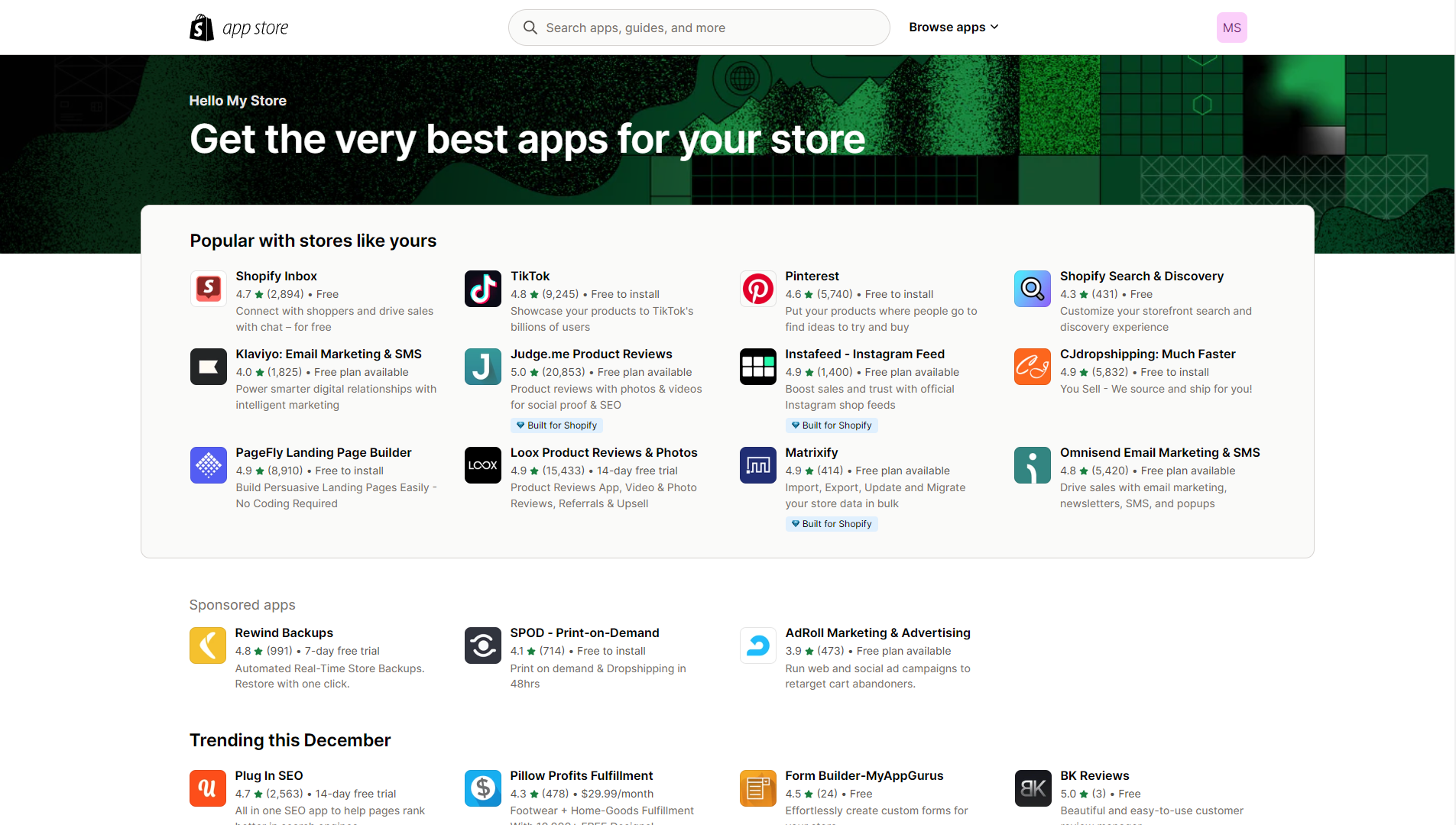
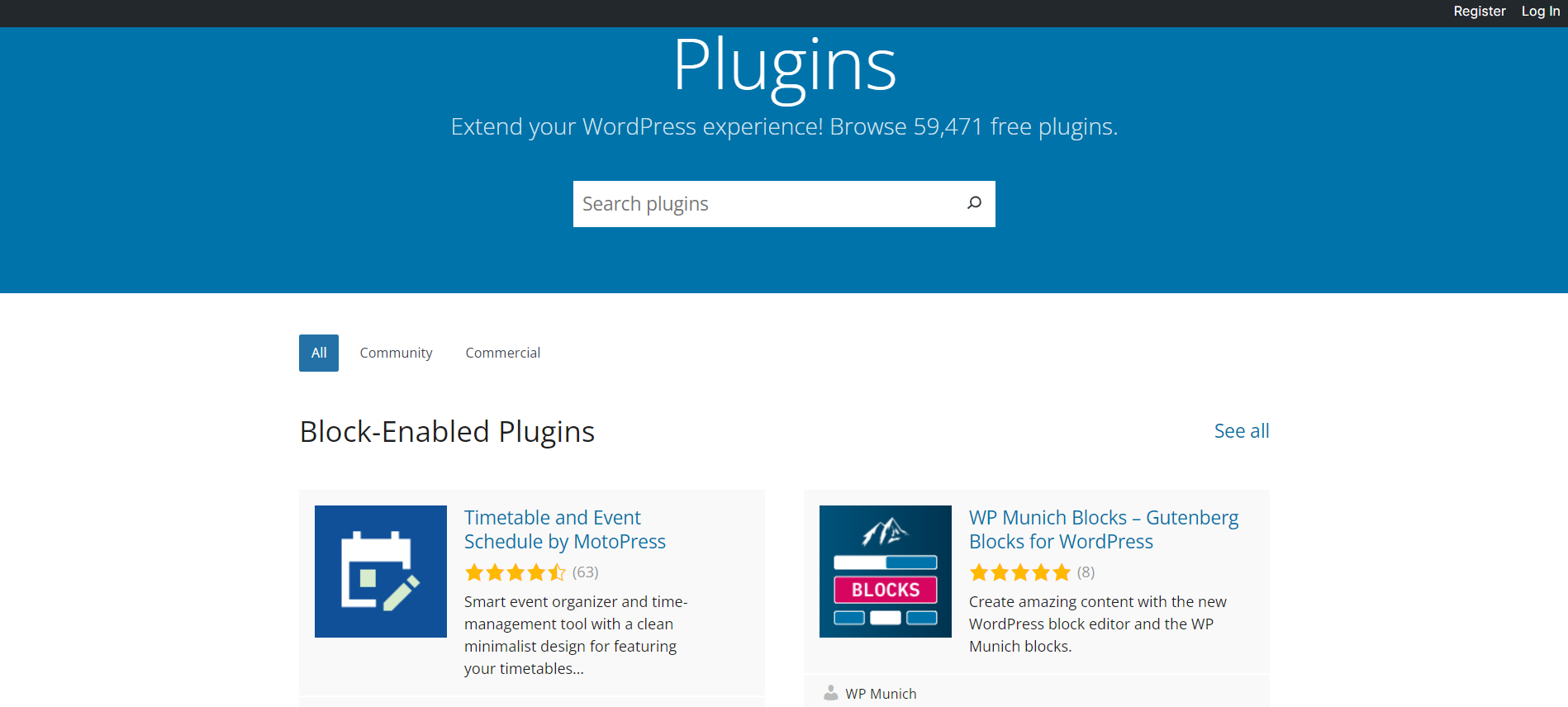
Marketing Features
Design FunctionalitiesRepresents how well each platform allows for creative design and customization of websites.Score Components:
- Template Variety (30%): Range and quality of design templates.
- Customization (30%): Flexibility and options for design alterations.
- User Interface (20%): Ease and intuitiveness of the design process.
- Responsiveness (10%): Adaptability to different devices and screen sizes.
- Innovation (10%): Unique design features and tools.
 8.8
8.8
 7.2
7.2
🏆
Overall Winner: Shopify
. Shopify stands out for its more advanced ecommerce-focused marketing tools, especially in analytics and ad campaign management. 10Web, while offering a range of marketing features, relies heavily on plugins for functionality.
 |
 |
|
|---|---|---|
SEO Tools |
✓ (AI Assisted SEO Pack) |
|
Email Marketing |
In their roadmap |
|
Blogging |
||
Social Media Integration |
Advanced integration for selling directly on social platforms |
Free plugins available |
Analytics and Reporting |
Detailed analytics for in-depth insights |
Free plugins available |
Ads and Promotions |
Google Ads integration; sophisticated ad campaign management |
Free plugins available |
Customer Support
Customer supportEvaluates the quality and availability of support options.Score Components:
- Response time (40%): Speed of support responses.
- Support quality (30%): Effectiveness and helpfulness of the support.
- Availability (20%): Range of support channels (phone, chat, email).
- Resource richness (10%): Quality of self-help and educational materials.
 8.6
8.6
 9.1
9.1
🏆 Winner: 10Web
. In the Shopify vs 10Web comparison, 10Web takes the lead with a higher customer support score. 10Web’s 24/7 customer support is highly praised for its responsiveness and expertise, particularly beneficial for startups and businesses needing reliable assistance. The AI-powered live chat provides instant access to educational resources and help center articles, ensuring users can quickly find solutions to their problems.
Shopify also offers robust 24/7 support through chat, email, and phone, with clear tutorials and a supportive community. Its extensive marketing blog and forums provide valuable information for business growth. For enterprise-level businesses, Shopify offers dedicated account managers and priority support, making it a strong contender in customer support. However, 10Web’s exceptional responsiveness and AI-driven support give it an edge in this category.
Security
SecurityLooks at the platforms’ security measures and data protection.Score Components:
- Data protection (40%): Safeguards for user and customer data.
- SSL and encryption (30%): Implementation of secure connections.
- Compliance (20%): Adherence to industry security standards.
- Regular updates (10%): Frequency of security updates and patches.
 9.0
9.0
 9.2
9.2
🏆
Winner: 10Web
. 10Web’s security score is slightly higher than Shopify’s, indicating a more robust security infrastructure. 10Web’s commitment to data protection is integral to their service, offering users a secure environment for their websites and data. They emphasize website security as a key feature of their platform, offering automated real-time backups, security scanning, and hack cleanup services to ensure that websites are protected against threats.
Shopify also prioritizes data privacy and security through rigorous measures, including secure infrastructure, encryption, and limited access. They comply with data privacy regulations, practice data minimization, and ensure user control and transparency. However, 10Web’s higher security score and comprehensive security measures give it the edge in this comparison.
AI Capabilities
AI capabilitiesMeasures the effectiveness of AI-driven features and tools.Score Components:
- Automation efficiency (40%): Impact of AI on streamlining processes.
- Personalization (30%): AI-driven customization for users or customers.
- AI-Assisted design (20%): Role of AI in website design and functionality.
- Data analysis (10%): Use of AI in interpreting user data and analytics.
 7.9
7.9
 9.2
9.2
 |
 |
|
|---|---|---|
Personalized Design |
10Web AI offers tailored design suggestions based on user inputs |
|
SEO Optimization |
AI-driven recommendations for better search engine visibility |
AI-guided SEO advice for optimal content placement and structure |
Customer Behavior Analysis |
Advanced analytics to understand customer preferences |
|
Sales Predictions |
AI-powered sales forecasting tools |
|
Inventory Management |
AI tools to assist in efficient inventory handling |
|
Content Generation |
AI assistance in creating and optimizing site content |
🏆 Winner: 10Web
. 10Web’s AI capabilities, particularly through its AI Website Builder, are highly user-friendly and innovative. It excels in offering personalized website design suggestions, content optimization, and streamlined site setup processes. 10Web’s AI also assists in providing SEO recommendations and layout adjustments based on user behavior.
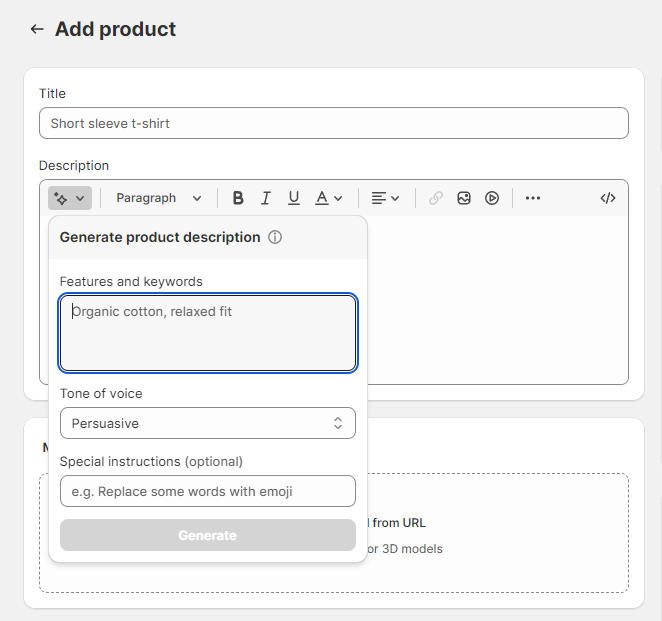
Shopify, with a score of 7.9, utilizes AI mainly to enhance the ecommerce experience. Its AI features focus on customer behavior analysis, personalized shopping experiences, inventory management, and sales predictions. While Shopify’s AI is powerful, it is more business and data-centric compared to 10Web’s design-focused AI.
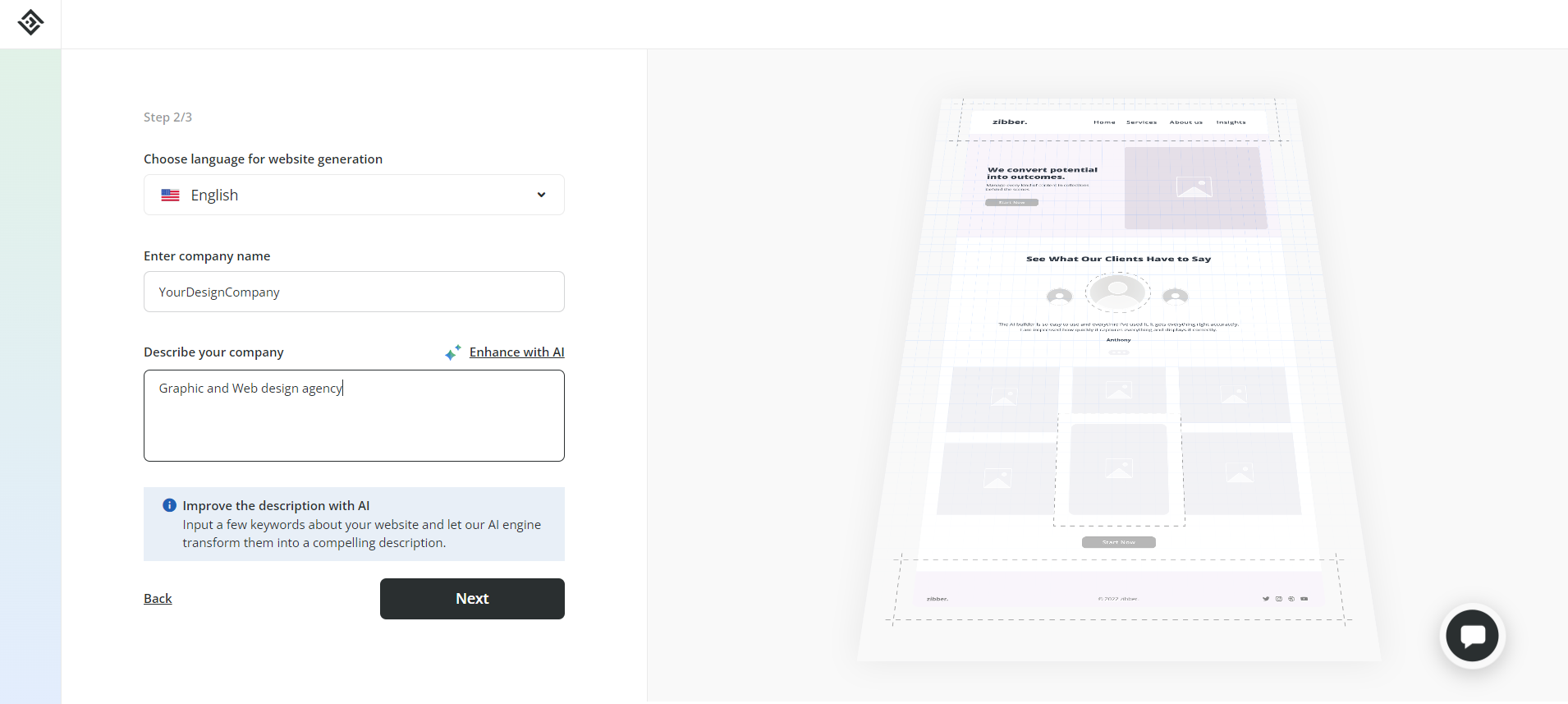
User Management
User ManagementAssesses the platforms’ capabilities in managing user roles, permissions, and accessibility.Score Components:
- Role Customization (40%): Flexibility in creating and defining user roles and
permissions. - Ease of Management (30%): User interface and tools for managing users.
- Access Control (20%): Effectiveness of access control measures for different user
levels. - Scalability (10%): Ability to manage a growing number of users efficiently.
 6.5
6.5
 8.7
8.7
🏆 Winner: 10Web
. Managing your online team with Shopify and 10Web involves different approaches to website editing access.
- Shopify enforces staff account limits based on plans, ranging from 2 to 15, with Shopify Plus offering unlimited
accounts. Collaborators with limited access are also an option. - 10Web’s user management feature enables website administrators to assign specific tasks and access levels to team members, facilitating collaboration while maintaining site security. It’s designed to support a range of roles from administrators to contributors, ensuring that each user has the appropriate access needed for their role in managing and updating the website’s content and structure. One thing that’s missing from 10Web is the ability to use the editor simultaneously with other users, but when it comes to general website management you can do changes alongside other users.
Shopify User Roles and Access Levels:
| Role | Description | Access Highlights |
|---|---|---|
| Store Owner | Full control over store | Manage products, orders, discounts, payments, apps, settings. Create and manage staff accounts. |
| Staff | Configurable access by owner | Add/edit products, manage orders, fulfill orders, manage customers, update content. Access level can be customized by the owner. |
| Collaborator | Limited access for external partners | View and manage specific sections like blog or product categories. Cannot access full store settings. |
10Web User Roles and Access Levels:
| Role | Description | Access Highlights |
|---|---|---|
| Admin | Has comprehensive access to workspace features, enabling full operational control except for managing other users. | Full feature access (except user management) – Access to billing |
| Contributor | Focuses on website management within the workspace, ideal for those leading development or project management. | Manage websites (add, remove, manage) – No access to user management, white label, and billing |
| Member | Engaged in specific tasks, often contributing to or reviewing projects, with limited access. | Access only to selected websites (live or staging) – Ideal for clients, developers, designers, marketers |
Additional Features
 |
 |
|
|---|---|---|
SSL Certificate |
||
Custom Domain |
||
Free Custom Domain Included |
||
International Domains |
||
Mobile Responsive |
||
Page Speed |
||
Website Builder Mobile App |
||
Convert a Website To An App |
||
Website Analytics |
||
Multilingual Sites |
||
Multiple Users |
Shopify vs 10Web: User Feedback
Shopify’s slightly higher rating on G2 Crowd can be largely attributed to its specialization in ecommerce. Its comprehensive features, ease of use, and robust customer support cater specifically to online businesses, leading to high user satisfaction among those seeking a dedicated ecommerce solution.
Reviews of 10Web on G2 highlight its exceptional customer support, with users appreciating the responsiveness and expertise provided. The platform is praised for its ease of use, AI-driven technology for website building, and comprehensive WordPress integration. While some users note a learning curve and the need for additional development for complex features, the overall sentiment is positive. Users value the platform for simplifying the website development process, offering reliable hosting, and enhancing productivity with its AI tools. Concerns are minor and typically revolve around pricing and initial setup challenges.
The making of this blog
We followed a clear, step-by-step process to write and research this article.
Shopify vs 10Web: FAQ
Which platform is better for ecommerce, Shopify or 10Web?
Can I use 10Web for a non-ecommerce website?
How do Shopify and 10Web compare in terms of website speed optimization?
Which platform offers better customer support, Shopify or 10Web?
Are Shopify and 10Web suitable for beginners?
How do the AI capabilities of Shopify and 10Web compare?









